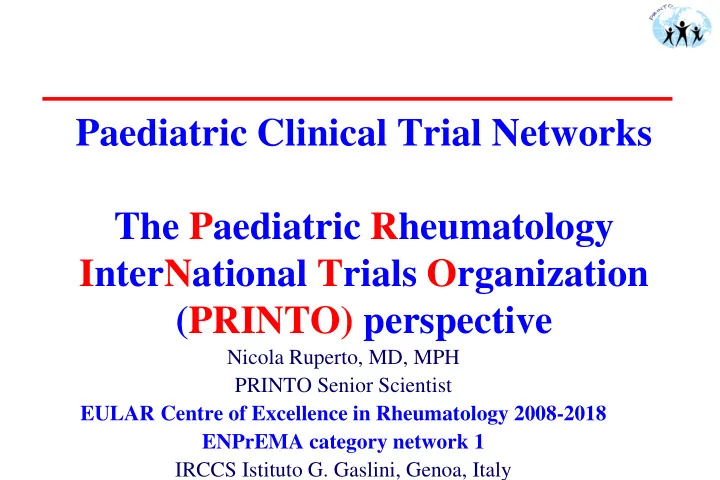

Paediatric Clinical Trial Networks The Paediatric Rheumatology InterNational Trials Organization (PRINTO) perspective Nicola Ruperto, MD, MPH PRINTO Senior Scientist EULAR Centre of Excellence in Rheumatology 2008-2018 ENPrEMA category network 1 IRCCS Istituto G. Gaslini, Genoa, Italy
Outline PRINTO outline - academic projects and - trials with pharmaceutical companies Clinical and scientific expertise at specialty level is needed to design and implement scientifically- sounded paediatric trials and academic projects
www.printo.it (>80 countries, >500 centres) www.pediatric-rheumatology.printo.it • EULAR Centre of Excellence in Rheumatology 2008-2018 • Category 1 ENPrEMA Italy, May 19, 1996 “...to foster, facilitate, and conduct high quality research in the field of paediatric rheumatology...” PRINTO bylaws Ann Rheum Dis. 2005 Arch Dis Child 2011-2012 >4,000 people/day from over 180 countries
PRINTO not-for-profit studies (>37,500 pts in 300 centres in 67 countries) No centres West East Latin North Others Totals / countries Europe Europe America America 300/67 MTX1 633 56/20 492 55 66 8 12 HRQOL 32/32 3,988 1,388 903 365 6644 JSLE 108/39 247 102 150 37 21 557 JDM 95/36 159 37 78 17 3 294 Cyclosporine 344 56/22 203 27 25 85 4 MTX2 61/29 193 80 80 11 364 Vasculitis 93/36 599 353 260 6 181 1399 JDM 53/20 89 10 39 1 139 Eurofever 100/35 2981 349 68 1 185 3584 EPOCA 120/49 6044 3635 1308 723 2175 13885 MAS 90/31 659 99 74 148 131 1111 Pharmachild 86/32 5252 2401 576 219 8448 Abirisk 148 24/12 115 33
PRINTO-PRCSG Enrollment (3495 patients in 268 centres in 40 countries) No centres West East Latin America North Others Totals / countries Europe Europe America 268/40 Etanercept 9/2 69 69 Etanercept 38/19 43 75 5 4 127 Infliximab 31/14 62 10 28 23 123 Adalimumab 31/8 57 26 88 171 Abatacept iv 43/12 69 94 27 190 48/12 97 5 63 23 19 207 Abatacept sc Tocilizumab syst 42/18 54 7 22 24 5 112 Tocilizumab poly 58/15 50 50 60 24 4 188 Canakinumab PII 5/5 23 23 Canakinumab P III 63/22 128 27 16 19 190 Golimumab 33/13 69 46 30 28 173 Meloxicam 31/7 130 96 226 Adalimumab 90/17 274 60 5 505 5 849 registry Abatacept registry 23/14 151 26 3 14 194 Rilonacept 59/22 134 35 82 69 7 327 Certolizumab Pegol 34/7 44 39 80 163 Tofacitinib poly 163 49/10 13 38 24 84 4
10 years of the EU Paediatric regulation The last 10 years have seen some considerable progress …. Rheumatology or infectious diseases are often referred to as prime examples. The significant surge of new treatments for children with rheumatologic diseases following the completion of PIPs has transformed a sector, which was previously neglected.
Drug development: «the central paradigm» Defined protocols «offered» to academia Phase IV and Phase I Phase II Phase III post-marketing No specific pediatric requests PIP by the legislation Submission
PRINTO liaisons with pharma companies Scientific collaboration: - PIP (over 20) /Protocol/CRF drafting • Study design, inclusion/exclusion criteria - Pediatric rheumatology concerns (drug prioritization) Service to companies - feasibility for site selection (deep knowledge of the centres) - Training and investigator certification (Joint assessor certif) - PRINTO/PRCSG primary outcome evaluation Analysis and reporting Publications (over 200 manuscripts)
Drug development: «the PRINTO paradigm» PRINTO academic PRINTO collaboration with pharmacovigilance pharmaceutical companies pharmachild Phase I Phase II Phase III Phase IV and post-marketing PRINTO No specific pre-PIP pediatric requests PIP Protocol (PIP) by the legislation Revision Submission
Open problems Paradox: too many studies too few patients - Me-too-drugs: perform «just» pk-dose findings/safety open label trials - Biosimilars: missing point in the legislation; perform «at least» pk-dose findings/safety open label trials Study prioritisation: not all studies are scientifically sounded greater intervention from academia Greater use of extrapolation The ethical case of drug provision after trial end
Enpr-EMA C1: Research experience and ability C2: Network organisation and processes C3: Scientific competencies and Category 1 : Networks fulfilling all capacity to provide expert advice minimum criteria for membership C4: Quality management Category 2 : Networks potentially C5: Training and educational fulfilling all minimum criteria – but capacity to build competences in need to clarify some issues before C6: Involvement of patients, parents becoming a member of Enpr-EMA. or their organisations in trials Category 2 : Networks currently not yet fulfilling minimum criteria
The networks paradigm via Enpr-EMA Networks academic Network collaboration with pharmacovigilance pharmaceutical companies Phase I Phase II Phase III Phase IV and post-marketing Network pre-PIP PIP Network PIP Submission Revision
Network «perspective»: a simplified practical approach Early and repeated intervention by academia - Pre-PIP (attention to pK-dose finding) - Drug and studies prioritization - Pre-protocol finalisation - Revision of definitive protocol and CRF - Feasibility for centre identification - Assistance during the conduct of the trial (e.g. recruitment facilitation, outcome evaluation etc)
Network Clinical/Scientific Advisor(s) Pre-PIP involvement of health professionals(s)/families with clinical expertise - Knowledge of treatment paradigms - Revision of inclusion/exclusion criteria - (Clinical trial methodology) Continuous collaboration with pharma from PIP to trial implementation - Centre knowledge for feasibility (peer-to-peer) - Protocol and CRF revision Facilitation by Enpr-EMA (WG interaction network-industry-regulators by S. Tansey)
LUCA SIMONA IT developer Finance & contracts Pharmachild ELISA EUGENIA CHIARA JDM Share Eurofever Pharmachild Epoca Pharmachild MedDRA expert MARCO MypanE Epoca IRENE LAURA FRANCESCA Pharmachild Clinical Trials Mypan Statistician Pharmachild MARIANGELA JDM IT developer SILVIA Share Epoca
Recommend
More recommend